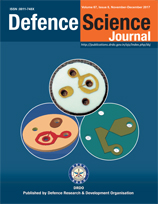Fractional Calculus Guidance Algorithm in a Hypersonic Pursuit-Evasion Game
DOI:
https://doi.org/10.14429/dsj.67.10897Keywords:
Pursuit-evasion game, Target manoeuver, Fractional calculus, Guidance law, Hypersonic weaponAbstract
Aiming at intercepting a hypersonic weapon in a hypersonic pursuit-evasion game, this paper presents a fractional calculus guidance algorithm based on a nonlinear proportional and differential guidance law. First, under the premise of without increasing the complexity degree of the guidance system against a hypersonic manoeuvering target, the principle that the differential signal of the line-of-sight rate is more sensitive to the target manoeuver than the line-of-sight rate is employed as the guidelines to design the guidance law. A nonlinear proportional and differential guidance law (NPDG) is designed by using the differential derivative of the line-of-sight rate from a nonlinear tracking differentiator. By using the differential definition of fractional calculus, on the basis of the NPDG, a fractional calculus guidance law (FCG) is proposed. According to relative motions between the interceptor and target, the guidance system stability condition with the FCG is given and quantitative values are also proposed for the parameters of the FCG. Under different target manoeuver conditions and noisy conditions, the interception accuracy and robustness of these two guidance laws are analysed. Numerical experimental results demonstrate that the proposed guidance algorithms effectively reduce the miss distance against target manoeuvers. Compared with the NPDG, a stronger robustness of the FCG is shown under noisy condition.
Downloads
Published
How to Cite
Issue
Section
License
 Where otherwise noted, the Articles on this site are licensed under Creative Commons License: CC Attribution-Noncommercial-No Derivative Works 2.5 India
Where otherwise noted, the Articles on this site are licensed under Creative Commons License: CC Attribution-Noncommercial-No Derivative Works 2.5 India


